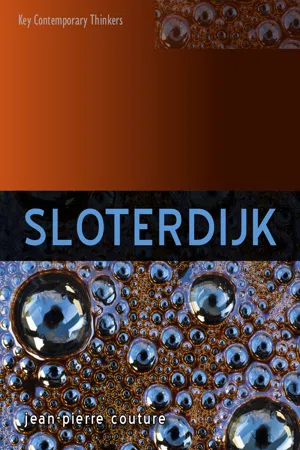Psychopolitics as rejection of historicism
Sloterdijk's psychopolitical inquiry emerges out of his doctoral thesis on autobiographical narratives in the Weimar Republic.2 He describes these life stories as a “form of social praxis” (LOL 6) that reveal the mental structure of a state of society via the so-called subjective and objective outpourings of individuals. Psychopolitics thus assumes that psychological moods are qualities that can be transferred from individuals to collectivities and vice versa. This transference (Übertragung), taken from the vocabulary of psychoanalysis, is, moreover, at the very heart of Sloterdijk's relationship with time and space and with stories and territories that he synchronizes or superposes by means of transmigration.
These processes were also explored in Der Zauberbaum (The Magic Tree), Sloterdijk's one and only novel. At the book's end, the protagonist Jan van Leyden, an assistant to the hypnotist Marquis de Puységur at the time of the French Revolution, enters the body of Sigmund Freud in his Berggasse office in Vienna (ZB 318–22). This allusion to the fantasies of occultism is not coincidental, insofar as it exemplifies one aspect of Sloterdijk's particular talent and frivolity, when he sets about aligning significant cultural moments with one another and inserting himself into them as a key author. It is worth recalling in this regard that he wrote the preface to Critique of Cynical Reason in the summer of 1981 on the occasion of the bicentenary of Kant's Critique of Pure Reason (CCR xxx), that his novel on the “discovery of psychoanalysis in 1785”3 was uncoincidentally published in 1985, and that it was he who was chosen by the Nietzsche-Archiv to give a talk at Weimar on August 25, 2000, the hundredth anniversary of the death of Nietzsche (NA). It was this same Nietzsche who was the first philosopher to be discussed in the Critique of Cynical Reason (CCR xxvii–xxix), the first to whom Sloterdijk dedicated a scholarly book (TS), and whom he still defends with the utmost ardour and clarity.4
Psychopolitical transference seeks to draw out homologous mental structures among epochs and times far removed from one another. Nietzsche's imprint in this regard will be discussed later. For the moment, however, it is worth noting that Sloterdijk's psychopolitics postulates the synchronicity of certain periods when their moods are concordant with one another. History is neither a continuous nor a discontinuous series of mental or cultural states. Rather, it is a serpentine air duct able to establish contact, via improbable airlocks, between atmospheres accidentally separated in time.
In a short text with the strange though revealing title “Weimar and California,”5 Sloterdijk argues that psychopolitics inserts itself as a cure for the omnipotence of the historicism that saturated Germany in the 1970s, because this rebirth of the philosophy of history was unfit to serve as a “therapeutic compensation for collective identity crises.”6 The reason, notes Sloterdijk, is that modern philosophies of history (liberalism, Hegelianism, and Marxism) are unable to answer the vital questions: “Who are we really and how should we live?”7 Because of this failure, he links the mood of the Weimar Republic to that of California in the 1980s. The public's widespread infatuation with a vocabulary of crisis – including pain, loss, social decadence, mistrust of the world, denegation, restoration, and escape into the absolutely new – appears to call upon the same solution in both cases, namely, “dissonance and emptiness” and hurried patchworks of new syntheses that annihilate critical thought.8 The danger here is that these climates could ultimately foster the increased importance of fatal charismatic figures “as if our own past flowed once again towards us.”9
Sloterdijk is not speaking as an historian but on behalf of an art form – that of the historical virtuoso – able to attain the “suprahistorical” dimension that Nietzsche prescribed as the cure for the excesses of the science of history. In his Untimely Meditations, Nietzsche argues that historicism is hostile to life and youth, that is, to the creative instinct of art: “In producing this effect, history is the antithesis of art: and only if history can endure to be transformed into a work of art will it perhaps be able to preserve instincts or even evoke them.”10 Sloterdijk fully subscribes to Nietzsche's diagnosis and wholly endorses the idea that life is prey to forces contrary to its vital impulse: “It is sick with many illnesses and not only with the memory of its chain – what chiefly concerns us here is that it is suffering from the malady of history. Excess of history has attacked life's plastic powers, it no longer knows how to employ the past as a nourishing food.”11
For Nietzsche and Sloterdijk, this looming evil can be countered only by the hardiness of the historical virtuoso, who becomes the hero through whom art and history are reunited in the suprahistorical. This virtuoso “has developed in himself such a tenderness and susceptibility of feeling that nothing human is alien to him; the most various ages and persons continue to sound in kindred notes on the strings of his lyre.”12 Going to the heart of Sloterdijk's light-hearted and creative relationship with the seriousness of the discipline of history, this passage helps us to understand why he would rather explore the passageways and other airlocks between and among epochs and why he allows himself to fold space and annihilate time.
In sum, psychopolitics is a fully Nietzschean undertaking that, in light of Sloterdijk's foundational inquiry into cynicism, would make Nietzsche a very timely author, given that, in 1874, he had already written: “[t]he oversaturation of an age with history … leads [it] into a dangerous mood of irony in regard to itself and subsequently into the even more dangerous mood of cynicism.”13




